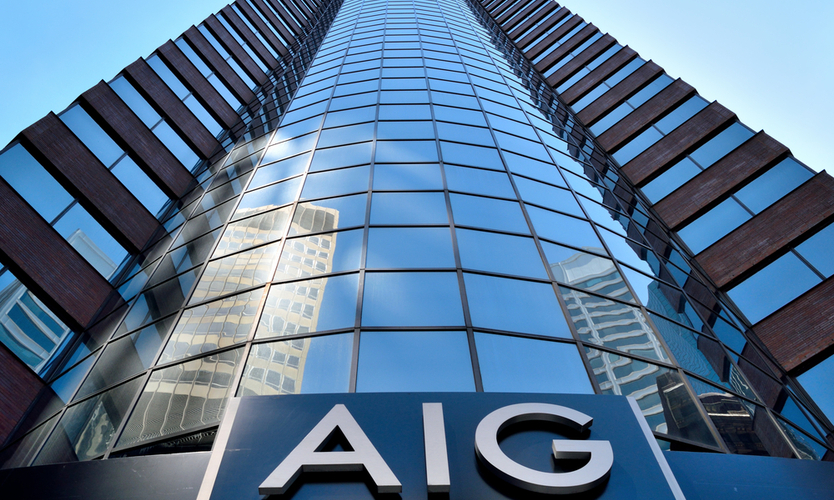American International Group swung to a second-quarter profit, aided by heady gains in its private-equity investments and the absence of Covid-19-related charges.
The quarter was the first full one under new Chief Executive Peter Zaffino, and comes as the company is preparing to hive off its big life-insurance and retirement unit into a self-standing company. In July, it said that investment firm Blackstone will purchase a 9.9% equity stake in the unit for $2.2 billion in cash and manage certain of its assets.
The global insurance conglomerate is one of the last publicly traded insurers to post quarterly results.
The company reported a 24% increase in “net written premiums,” a key metric of revenue growth, for its property-casualty operations, attributable partly to new business and premium-rate increases. The rate increases helped improve its underwriting results. Overall, AIG posted net income of $91 million, compared with a net loss of $7.9 billion in the year-earlier quarter, when it booked a loss from the sale of a reinsurance unit for discontinued business lines and old investments.
AIG joined some other big insurers in boosting its share-buyback program, adding $5.1 billion to the $900 million in its current allocation. On Wednesday, Allstate Corp. and MetLife Inc. added $5 billion and $3 billion, respectively, on the back of improved earnings and recent divestitures of units judged noncore.
Subscribe to our Newsletter to increase your edge. Don’t worry about the news anymore, through our newsletter you’ll receive weekly access to what is happening. Join 120,000 other PE professionals today.
AIG’s adjusted after-tax income, which is closely followed by analysts because it excludes items considered nonrecurring, totaled $1.33 billion, up 137% from the year before.
For the industry, this year’s second quarter marks a stark contrast to a year ago as the coronavirus took a heavy toll on the U.S. economy. For many business insurers, the year-ago results included the booking of reserves to cover expected pandemic-related claims. At AIG, those year-earlier Covid-19 losses tallied $458 million for anticipated claims on products such as travel insurance and accident-and-health policies.
AIG didn’t add to its Covid-19 reserves in this year’s second quarter.
Also aiding insurers in the second quarter was strong performance of their private-equity investments. While insurers mostly invest in high-quality bonds, many allocate a single-digit percentage of their investment portfolios to private-equity funds. Private-equity funds have performed well as companies owned by leveraged-buyout and venture-capital funds have gone public at high valuations in the rallying stock market.
Insurers’ report private-equity results with a one-quarter lag, so insurers’ second-quarter results reflect first-quarter activity. Analysts expect insurers to have strong private-equity income in their third-quarter results, too.
In other results this week, Allstate on Wednesday posted a 52% decrease in underwriting income for its car- and home-insurance business, though the company’s overall net income surged 30% to $1.6 billion. The improvement in net income was partly due to higher private-equity investment income.
In its car-insurance business, accident volume jumped 47% from the year-earlier period, but remained below the same period in pre-pandemic 2019 because large numbers of people continue to work remotely, Allstate Chief Executive Tom Wilson said in an interview.
In the year-earlier quarter, insurers benefited from an unprecedented drop in miles with a subsequent steep decline in accident volume, as many Americans hunkered down in their homes during the early stages of the Covid-19 pandemic. At the time, underwriting profits soared, even as many car insurers refunded some premiums to customers.
Total miles driven “are pretty close to, and in some places higher than, pre-pandemic,” Mr. Wilson said.
Like some other carriers, Allstate noted that repairs are costing more as the broader economy struggles with supply-chain bottlenecks.
Also Wednesday, MetLife said its second-quarter net income surged to $3.37 billion from $68 million in the proper-year period, buoyed by a gain from the sale of its car- and home-insurance unit, higher revenue in its employer-benefits business, and higher private-equity investment income.
Source: Wall Street Journal
Can’t stop reading? Read more
Ardian to acquire 90% stake in Centrotherm, boosting European semiconductor portfolio
Ardian to acquire 90% stake in Centrotherm, boosting European semiconductor portfolio Ardian has...
Beijing pushes fund managers to launch more equity funds in bid to revive markets
Beijing pushes fund managers to launch more equity funds in bid to revive markets Chinese...
Brookfield smashes fundraising record, lifts credit reach with Oaktree acquisition
Brookfield smashes fundraising record, lifts credit reach with Oaktree acquisition Brookfield...




